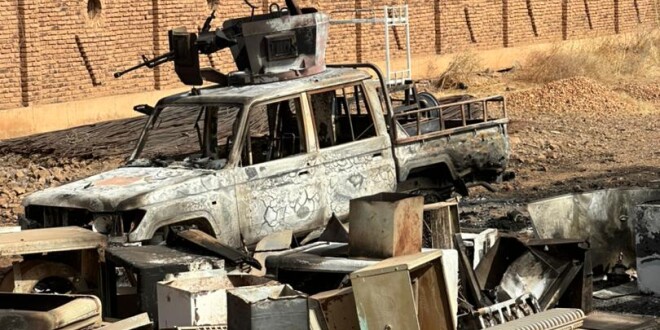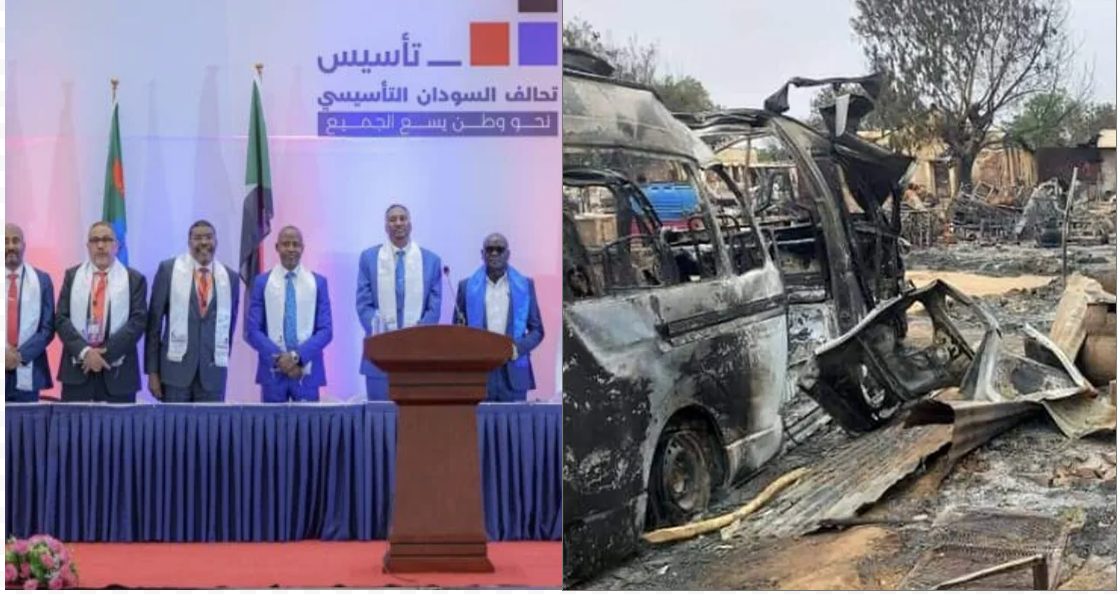
One Year On, Civil War Risks Reviving Jihadism in Sudan
One Year On, Civil War Risks Reviving Jihadism in Sudan
Executive Summary:
- April 2024 marked the first anniversary of the Sudanese civil war, with the risk of Sudan re-emerging as a hub for jihadist terrorism in Africa on the rise. Some elements of the Sudanese Armed Forces under General al-Burhan are believed to have close ties to the Muslim Brotherhood, and Islamic State has already seen success in using Sudan as a recruiting and logistics hub.
- Islamist-leaning militias are growing more prominent locally, and foreign fighters from radicalized members of the Sudanese diaspora already involved with jihadist groups abroad may travel to Sudan to gain combat experience.
April 2024 marked the first anniversary of the Sudanese civil war, which has pitted General Abdelfattah al-Burhan’s Sudanese Armed Forces (SAF) and Mohamed Hamdan Dagalo’s Rapid Support Forces (RSF) against each other (see Terrorism Monitor, April 28, 2023, May 26, 2023, December 15, 2023). The conflict risks turning Sudan once again into a hub for jihadist terrorism. In its 2024 Annual Threat Assessment in February, the U.S. intelligence community warned that Sudan could return to being a conducive environment for terrorists—all the more important due to its geographical location at the crossroads of North Africa, the Horn of Africa, and the Sahel (Office of the Director of National Intelligence, February 5, 2024).
Sudan’s Complicated Jihadist History
Sudan has a complicated history with jihadist terrorism. In the 1990s, the Islamist military regime of General Omar al-Bashir and its architect, Islamist politician Hassan al-Turabi, harbored Osama bin Laden and several other militant groups. In its wars against South Sudanese secessionists and later in the conflict in Darfur from 2003 to 2020, the Islamist National Islamic Front (NIF) military regime also recruited, armed, and deployed Arab supremacist and Islamist paramilitary forces, which were known as the janjaweed.
After the ousting of al-Bashir from power in 2019 and the start of what was hoped to be a transition to democracy, Sudan was de-listed as a state sponsor of terrorism (U.S. Department of State, 2020). In Sudan’s current conflict landscape, General al-Burhan has been accused of aligning himself with the Sudanese Muslim Brotherhood and Islamist supporters of the former al-Bashir regime, known as the “Alkaisan” or “Kizan,” which is a local misnomer of the members of Muslim Brotherhood (Al Jazeera, April 14, 2024). While al-Burhan has refuted these accusations, SAF has mobilized auxiliary paramilitary forces, which are organized under the umbrella of “Popular Resistance Groups.” These include a variety of actors, including Islamists and “shadow brigades,” which consist of thousands of former army, police, and intelligence operatives from the reign of al-Bashir (AllAfrica, April 18, 2023; Terrorism Monitor, May 26, 2023).
One of the most active SAF-aligned paramilitary groups is the “Bara’a Ibn Malik Battalion,” which is widely associated with the Sudanese Muslim Brotherhood. Named after a famous Muslim combatant during early Islamic conquests, the group’s ideology is militantly Islamist and is led by a young Sudanese man, al-Musbah Abu Zaid. Videos have circulated on social media showing him singing militant songs and calling for a “jihad” against the RSF (Middle East Eye, September 28, 2023; iMArabic, February 6). Fighting in and around Khartoum, the Battalion has suffered numerous casualties, however, including some of its prominent members. In July 2023 more than 100 fighters were killed in combat in Khartoum, including one commander who had allegedly pledged allegiance to Islamic State (IS) (Arab Weekly, July 7, 2023).
The Sudanese Jihadist Landscape
Pro-IS social media outlets have been very active in keeping their supporters informed about developments in Sudan. These outlets see the violent clashes between the SAF and RSF as an opportunity to exploit the chaos and discredit its rivals, from local governments to other jihadist groups, like the Afghan Taliban. The group has, for example, instructed its supporters in Sudan to seize weapons and ammunition from both the SAF and RSF. Likewise, IS has encouraged Sudanese Muslims to wage jihad to implement Sharia law in the country (MEMRI, April 19, 2023).
The emergence of IS in 2014–2015 also contributed to increased domestic radicalization in Sudan, which led to hundreds of Sudanese, including children of entire families, to join the group abroad. Radicalized Sudanese nationals traveled beyond Syria and Iraq to join other jihadist groups in Libya and Boko Haram in the Lake Chad region (DabangaSudan, August 18, 2016; Radio Tamazuj, June 28, 2017). One important hotspot for IS recruitment, for example, was the University of Medical Sciences and Technology in Khartoum and its Islamic Cultural Association. Dozens of students, including some holders of U.S., UK, and Canadian passports, traveled there to join IS’s ranks (Daily Mail, June 29, 2015; Brookings Institute, August 15, 2015). This group included British citizen Ahmed Kheder (alias Abu Amir al-Muhajir). He encouraged other Sudanese students to join IS in the group’s propaganda before being killed in 2017 in Iraq (Daily Mail, June 15, 2015; Guardian, March 1, 2017).
Some Sudanese nationals attained leadership positions within IS structures, be it by rising through the ranks or defecting from other jihadist groups. IS’s province in Somalia, in particular, has included senior foreign fighters from Sudan from its inception. One of them was Bilal al-Sudani, who became a key operative and facilitator for IS, including leading the al-Karrar office before his elimination by U.S. special forces in Puntland, Somalia in January 2023 (Militant Leadership Monitor, March 2, 2023).
Logistics Hub
Just as Sudanese flocked to join IS, the organization also became interested in Sudan for other purposes. In 2016, Moez Fezzani, a key leader in the IS-Tunisia networks, was arrested in Sudan after fleeing from Libya (Reuters, December 23, 2016). In 2019, Sudan claimed it arrested six members of Nigeria’s Boko Haram in the Darfur region near the country’s border with Chad (Sudan Tribune, December 5, 2019). In 2021, the Sudanese intelligence service conducted raids in the Jabra and al-Azhari neighborhoods of Khartoum against IS cells planning attacks against Westerners in the city. While the security authorities lost five members in firefights with the suspects, authorities arrested 11 individuals, who were all foreign citizens (MENA Affairs, September 29, 2021). Further counter-terrorism operations led to the arrest of several more terrorist suspects, including a Somali citizen (Agenzia Nova, October 14, 2021).
More recently, the UN Analytical Support and Sanctions Monitoring Team reported that IS cells in Sudan and IS financing in the country are overseen by an Iraqi national, Abu Bakr al-Iraqi. He is alleged to have established multiple businesses under false identities in both Sudan and Turkey. Al-Iraqi supposedly has managed money exchange enterprises and a tourism agency in Turkey and significant investments in Sudan (UN Analytical Support and Sanctions Monitoring Team, July 25, 2023). According to the UN, as of 2023, IS’s network in Sudan is comprised of approximately 100 to 200 experienced fighters who facilitate logistical operations and transactions. In addition, jihadists in North Africa utilize Sudan as a hub for travel towards southern Libya, Mali, and elsewhere in West Africa.
Showing its commitment to the IS leadership, IS operatives from Sudan pledged allegiance to the organization’s new caliph Abu Hafs al-Hashimi al-Qurayshi in a Telegram post earlier this year. This occurred in the same week that IS representatives from its Khorasan, Mozambique, and East Asian provinces did the same (Sudan War Monitor, March 14, 2024). It also demonstrates that IS loyalists remain in the country and communicate with IS’s centralized media apparatus.
Conclusion
Besides a shared ideological affiliation to militant Islamism, nothing currently links the Bara’a Ibn Malik Battalion to IS. However, the existence of local armed Islamist fighting forces raises the risk of foreign fighters in Sudan returning home to join the fight and infiltrating or taking over already existing groups. Thus, with the emergence of Islamist-leaning militias locally, Sudanese “diaspora” foreign fighters involved in jihadist groups abroad and with a broader interest in IS may use Sudan as a land bridge between theaters. This increases the risk of Sudan’s re-emergence as an African hub for jihadist terrorism.


